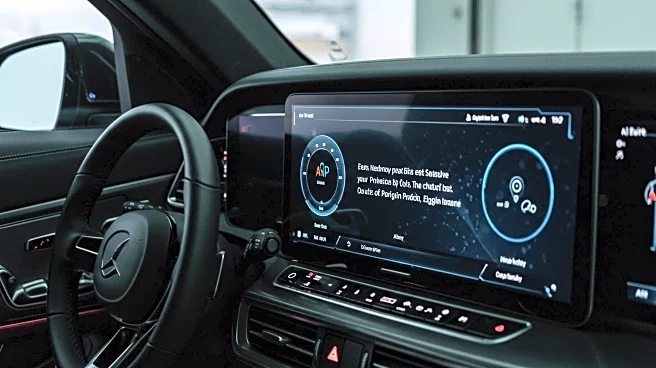What is the story about?
What's Happening?
The J.D. Power 2025 U.S. Tech Experience Index (TXI) Study has revealed the growing integration of artificial intelligence (AI) in vehicles, aimed at enhancing driver experience by anticipating needs. The study, now in its tenth year, includes a new category focusing on AI-based technologies such as smart ignition, climate control, and driver preferences. These technologies have shown improvements in vehicle quality scores, with smart climate control systems reducing problems per 100 vehicles (PP100) and increasing user satisfaction. However, challenges remain, such as the accessibility of features like car wash mode, which is often difficult to find within infotainment systems, causing frustration among users. In-vehicle payment systems are gaining interest, with 62% of owners expressing a desire for this feature, primarily for paying for charging, fuel, parking, and tolls.
Why It's Important?
The integration of AI technologies in vehicles represents a significant shift in the automotive industry, focusing on enhancing user experience and vehicle quality. These advancements have the potential to improve customer satisfaction and reduce cognitive workload for drivers. However, the challenges associated with these technologies, such as usability and accessibility, highlight the need for continued development to maximize their effectiveness. Automakers and suppliers must address these issues to ensure that AI technologies enhance rather than hinder the driving experience. The growing interest in in-vehicle payment systems also indicates a shift towards more convenient and integrated vehicle experiences, which could drive further innovation in the industry.
What's Next?
Automakers are expected to continue developing AI technologies to address current challenges and improve user experience. The focus will likely be on enhancing the accessibility and usability of features like car wash mode and in-vehicle payment systems. As recognition technologies become more prevalent, automakers will need to ensure consistent performance to avoid usability issues. The next generation of in-vehicle shopping and payment systems may succeed if designed to be simple and user-friendly, focusing on convenience purchases that enhance the vehicle experience. Continued innovation in AI technologies will be crucial for automakers to remain competitive and meet consumer demands.
Beyond the Headlines
The integration of AI technologies in vehicles raises ethical and privacy concerns, particularly with recognition and authentication technologies. As these technologies become more advanced, automakers must ensure that they do not compromise user privacy or security. Additionally, the shift towards AI-driven features may lead to changes in consumer expectations and driving habits, potentially influencing broader cultural and societal trends. The long-term impact of AI technologies on the automotive industry could include shifts in vehicle design, manufacturing processes, and regulatory standards.















